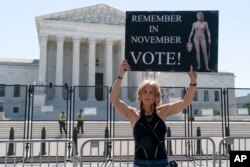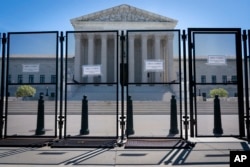Democratic strategist and pollster Tom Bonier has never experienced anything like it in his 28 years of analyzing elections.
"We're seeing women engage politically at a greater rate than I've seen before," he says.
In the month after the U.S. Supreme Court struck down Roe v. Wade, which guarantees a woman's right to an abortion, the number of women registering to vote in the November midterm elections rose by 35% in 10 states that share voter registration data, according to a New York Times analysis.
Those states include Kansas, Pennsylvania, Ohio, Oklahoma, Florida, North Carolina, Idaho, Alabama, New Mexico and Maine.
Bonier says the data shows women are also out-registering men in states like Wisconsin and Michigan, where reproductive rights are at risk.
Voters in Michigan will decide whether to amend the state's constitution to include protections for access to abortion. In Wisconsin, an 1849 law banning almost all abortions, which took effect after Roe v. Wade was overturned in June, is making its way through the courts.
But will any of these increased registrations turn into actual votes?
"We're beginning to see that pivot into voter turnout and participating in elections, first, in special elections, in these primary elections. And now we're beginning to get early data from the general election," Bonier says. "With mail ballot requests and that sort of thing, we're seeing this thread continue with women just engaging at a significantly higher rate than they have in previous midterm elections and than men are, for the most part, in this election."
Historically, the president's party loses seats in Congress during the midterm elections, and there was early talk of a Republican "red wave." But as the midterms approach, analysts are debating whether the abortion rights issue will upset political traditions.
"The variables are so ridiculous right now, and the ups and downs and the vicissitudes of the political world right now are so crazy that predicting this stuff just doesn't work the way it used to," says Samuel Abrams, a politics professor at Sarah Lawrence College in New York and senior fellow at the American Enterprise Institute. "We used to have models that were predictive. We do not have good models that predict this right now. It's just too messy."
The first test of reproductive rights after the Supreme Court ruling occurred in Kansas in August. Fifty-nine percent of Kansans voted to keep access to abortion in the solidly Republican state, dispelling the notion that abortion rights only matter to liberal Democratic voters.
"There are pro-choice Republicans. But there are also Republicans who might not personally be pro-choice, but they were against the notion of the government taking away an established right," Bonier says. "Even if that's a right they wouldn't utilize themselves, there's a level of discomfort with that, and I believe that's why you've seen so many Republicans being motivated on this issue, as well."
But Kansans voted in a referendum and were not forced to choose between Democrats and Republicans. The test in November will be whether substantial numbers of Republicans feel strongly enough about abortion rights to cross party lines.
"I don't think it's going to be as potent. … I think the [Supreme Court] decision is old enough that the intensity has changed," Abrams says. "So much could still change. We have no idea what's going to happen with Putin. We have no idea what's going to happen with North Korea. We have no idea about international monetary stuff. We have no idea about climate stuff."
Amanda Hunter, who leads the Barbara Lee Family Foundation, a nonpartisan group that works to advance women's representation in American politics, says that even before the Supreme Court ruling on abortion rights, women were already feeling that the political stakes were high.
"Especially since the pandemic exposed cracks in social systems for women. A lot of things that women didn't think about or took for granted, like child care, like the public school system … were all turned upside down," Hunter says.
"Women who maybe before thought, 'I'm not political, I don't care about politics,' suddenly realized that politics were showing up at their front door. And so, it seems that in the past two years, women have felt a personal stake in a lot of these decisions. And certainly, the Dobbs decision is very personal for a lot of women, given that it directly impacts women's reproductive decisions."
Abrams believes the Supreme Court abortion decision would have galvanized more voters had it happened closer to Election Day.
"One of the things that's really important to remember, and I say this all the time, is that a week is an eternity in politics and, as such, we have a while to go until November," he says.







